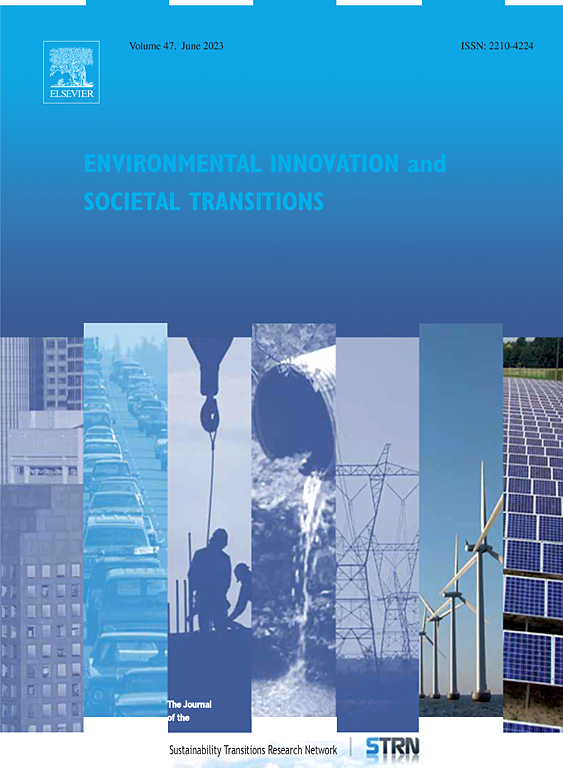在地方层面引导可持续转型进程:博恩霍尔姆能源岛案例
IF 5.7
2区 经济学
Q1 ENVIRONMENTAL SCIENCES
Environmental Innovation and Societal Transitions
Pub Date : 2024-11-14
DOI:10.1016/j.eist.2024.100930
引用次数: 0
摘要
本文探讨了与在边缘化地区引入大规模可持续能源基础设施项目有关的地方可持续转型过程,特别侧重于了解其作用以及复杂的发展考虑因素、潜力和困境。报告介绍了丹麦 "博恩霍尔姆能源岛 "的经验,该岛计划建设一个 3.8 千兆瓦的海上风电场,这可能会给当地带来新的商业和创新机会,同时也会引起人们对当地在这样一个大型项目中扮演东道主角色时的准备情况和能力水平的关注。实证基础包括 2022-2023 年当地开发项目的定性数据(观察和访谈)。研究结果根据可持续转型和周边化进程文献中的理论见解进行了分析和讨论,形成了四个分析维度:地方经济机遇与绿色通道;人口与劳动力困境;民主与参与;治理与能力建设。本文敦促对转型过程进行更全面、更有可比性和更具批判性的地方研究。本文章由计算机程序翻译,如有差异,请以英文原文为准。
Navigating sustainable transition processes at the local level: The case of Energy Island Bornholm
The paper examines local sustainable transition processes related to the introduction of large-scale sustainable energy infrastructure projects in peripheralized areas, with a specific focus on understanding their role and complex development considerations, potentials, and dilemmas. Experiences are reported from the Danish `Energy Island Bornholm´, where a 3,8 GW offshore wind farm field is planned, potentially presenting new, local business and innovation opportunities, whilst raising concerns about local preparedness and capacity levels when undertaking a host role in such a massive project. The empirical base consists of qualitative data (observations and interviews) from a local development project running 2022–2023. Findings are analysed and discussed based on theoretical insights from literature on sustainable transition and peripheralization processes, resulting in four analytical dimensions: Local economic opportunities and green paths; Demography and work force dilemmas; Democracy and involvement; Governance and capacity building. The paper urges more comprehensive, comparative, and critical place-specific research on transition processes.
求助全文
通过发布文献求助,成功后即可免费获取论文全文。
去求助
来源期刊

Environmental Innovation and Societal Transitions
Energy-Renewable Energy, Sustainability and the Environment
CiteScore
13.60
自引率
19.40%
发文量
90
审稿时长
56 days
期刊介绍:
Environmental Innovation and Societal Transitions serves as a platform for reporting studies on innovations and socio-economic transitions aimed at fostering an environmentally sustainable economy, thereby addressing structural resource scarcity and environmental challenges, particularly those associated with fossil energy use and climate change. The journal focuses on various forms of innovation, including technological, organizational, economic, institutional, and political, as well as economy-wide and sectoral changes in areas such as energy, transport, agriculture, and water management. It endeavors to tackle complex questions concerning social, economic, behavioral-psychological, and political barriers and opportunities, along with their intricate interactions. With a multidisciplinary approach and methodological openness, the journal welcomes contributions from a wide array of disciplines within the social, environmental, and innovation sciences.
 求助内容:
求助内容: 应助结果提醒方式:
应助结果提醒方式:


